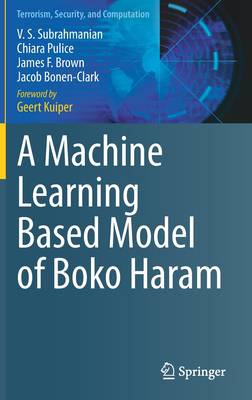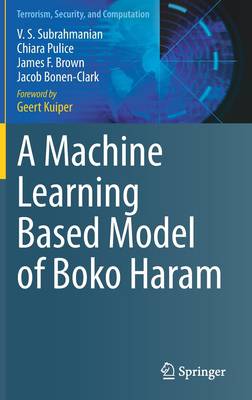
- Afhalen na 1 uur in een winkel met voorraad
- Gratis thuislevering in België vanaf € 30
- Ruim aanbod met 7 miljoen producten
- Afhalen na 1 uur in een winkel met voorraad
- Gratis thuislevering in België vanaf € 30
- Ruim aanbod met 7 miljoen producten
A Machine Learning Based Model of Boko Haram
V S Subrahmanian, Chiara Pulice, James F Brown, Jacob Bonen-ClarkOmschrijving
This is the first study of Boko Haram that brings advanced data-driven, machine learning models to both learn models capable of predicting a wide range of attacks carried out by Boko Haram, as well as develop data-driven policies to shape Boko Haram's behavior and reduce attacks by them. This book also identifies conditions that predict sexual violence, suicide bombings and attempted bombings, abduction, arson, looting, and targeting of government officials and security installations.
After reducing Boko Haram's history to a spreadsheet containing monthly information about different types of attacks and different circumstances prevailing over a 9 year period, this book introduces Temporal Probabilistic (TP) rules that can be automatically learned from data and are easy to explain to policy makers and security experts. This book additionally reports on over 1 year of forecasts made using the model in order to validate predictive accuracy. It also introduces a policy computation method to rein in Boko Haram's attacks.
Applied machine learning researchers, machine learning experts and predictive modeling experts agree that this book is a valuable learning asset. Counter-terrorism experts, national and international security experts, public policy experts and Africa experts will also agree this book is a valuable learning tool.
Specificaties
Betrokkenen
- Auteur(s):
- Uitgeverij:
Inhoud
- Aantal bladzijden:
- 135
- Taal:
- Engels
- Reeks:
Eigenschappen
- Productcode (EAN):
- 9783030606138
- Verschijningsdatum:
- 12/12/2020
- Uitvoering:
- Hardcover
- Formaat:
- Genaaid
- Afmetingen:
- 156 mm x 234 mm
- Gewicht:
- 385 g

Alleen bij Standaard Boekhandel
Beoordelingen
We publiceren alleen reviews die voldoen aan de voorwaarden voor reviews. Bekijk onze voorwaarden voor reviews.











